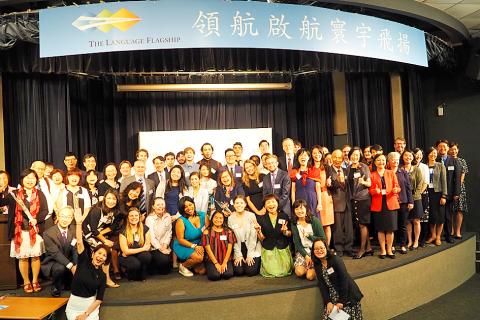The Chinese Overseas Flagship (COF) in Taiwan center, part of the US government-sponsored Language Flagship program, officially opened yesterday at National Taiwan University (NTU) in Taipei.
The Language Flagship is an undergraduate program that includes instruction in languages such as Arabic, Korean, Persian, Portuguese, Russian and Turkish under the US’ National Security Education Program (NSEP).
The NSEP was established in 1991 under the David L. Boren National Security Education Act that mandated the US secretary of defense to create such a program to provide scholarships for undergraduates, fellowships to graduate students and grants to US institutions to fund the study of countries and languages critical to the US’ national security.

Photo courtesy of the Ministry of Education
The COF in Taiwan center, which was established on June 3 and received its first batch of students last month, is one of two such centers in Asia; the other is at Nanjing University in China.
There had been one at Beijing Union University for several years, but the COF headquarters in the US is no longer using it for the capstone portion of the program, in which students who have completed four years of Chinese-language undergraduate courses take classes and intern in professional environments.
The Taipei center has 22 US students who have received scholarships of more than US$10,000 a year to study in Taiwan, center director Chao Der-lin (趙德麟) said at the opening ceremony.
Chao is a professor and head of the Chinese division at Hunter College in New York City as well as the director of that school’s Chinese Flagship center.
Hunter is one of the 12 universities that comprise the domestic Chinese Flagship in partnership with the US Department of Defense, and it has partnered with NTU to run the Taipei facility.
Aside from studying language and subjects related to their field of interest at NTU, the students will be able to intern at Taiwanese businesses and organizations, NTU said.
In a speech at the opening ceremony, American Institute in Taiwan Director Brent Christensen said that Taiwan is a good place to learn Chinese due to its safe environment, hospitable people and diverse culture.
Christensen encouraged the students to make the most out of their 10-month stay in Taiwan, saying that what he learned in Taiwan on his first overseas diplomatic assignment has helped his career.
Deputy Minister of Foreign Affairs Hsu Szu-chien (徐斯儉) said that the COF Taiwan Center is a milestone of US-Taiwan educational cooperation that symbolized strong Taiwan-US relations.
NTU already has a storied reputation for running intensive Mandarin language-training programs. Stanford University established a Mandarin training center on NTU’s campus in 1961, which two years later became the Inter-University Program (IUP) and over the next three decades set the standard for instruction in modern and classical Chinese.
In 1997, the US universities involved in the IUP moved the program to Tsinghua University in Beijing, while NTU assumed full administration for continuing the program on its campus, which it renamed the International Chinese Language Program.

Authorities have detained three former Taiwan Semiconductor Manufacturing Co (TMSC, 台積電) employees on suspicion of compromising classified technology used in making 2-nanometer chips, the Taiwan High Prosecutors’ Office said yesterday. Prosecutors are holding a former TSMC engineer surnamed Chen (陳) and two recently sacked TSMC engineers, including one person surnamed Wu (吳) in detention with restricted communication, following an investigation launched on July 25, a statement said. The announcement came a day after Nikkei Asia reported on the technology theft in an exclusive story, saying TSMC had fired two workers for contravening data rules on advanced chipmaking technology. Two-nanometer wafers are the most

Tsunami waves were possible in three areas of Kamchatka in Russia’s Far East, the Russian Ministry for Emergency Services said yesterday after a magnitude 7.0 earthquake hit the nearby Kuril Islands. “The expected wave heights are low, but you must still move away from the shore,” the ministry said on the Telegram messaging app, after the latest seismic activity in the area. However, the Pacific Tsunami Warning System in Hawaii said there was no tsunami warning after the quake. The Russian tsunami alert was later canceled. Overnight, the Krasheninnikov volcano in Kamchatka erupted for the first time in 600 years, Russia’s RIA

CHINA’s BULLYING: The former British prime minister said that he believes ‘Taiwan can and will’ protect its freedom and democracy, as its people are lovers of liberty Former British prime minister Boris Johnson yesterday said Western nations should have the courage to stand with and deepen their economic partnerships with Taiwan in the face of China’s intensified pressure. He made the remarks at the ninth Ketagalan Forum: 2025 Indo-Pacific Security Dialogue hosted by the Ministry of Foreign Affairs and the Prospect Foundation in Taipei. Johnson, who is visiting Taiwan for the first time, said he had seen Taiwan’s coastline on a screen on his indoor bicycle, but wanted to learn more about the nation, including its artificial intelligence (AI) development, the key technology of the 21st century. Calling himself an

South Korea yesterday said that it was removing loudspeakers used to blare K-pop and news reports to North Korea, as the new administration in Seoul tries to ease tensions with its bellicose neighbor. The nations, still technically at war, had already halted propaganda broadcasts along the demilitarized zone, Seoul’s military said in June after the election of South Korean President Lee Jae-myung. It said in June that Pyongyang stopped transmitting bizarre, unsettling noises along the border that had become a major nuisance for South Korean residents, a day after South Korea’s loudspeakers fell silent. “Starting today, the military has begun removing the loudspeakers,”